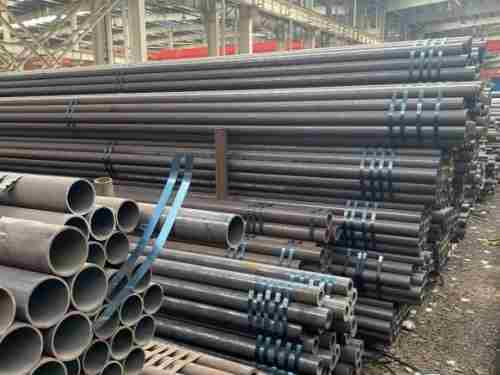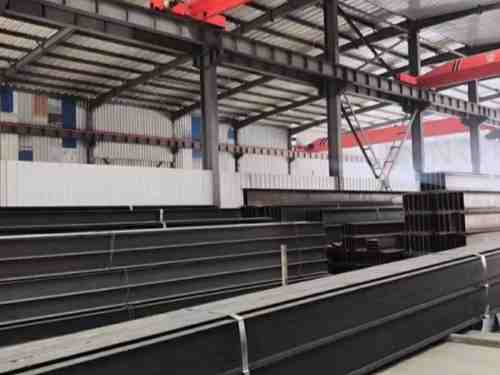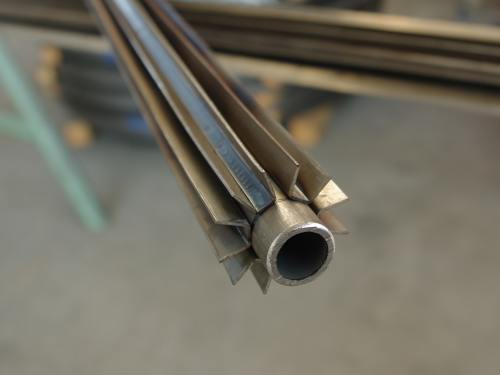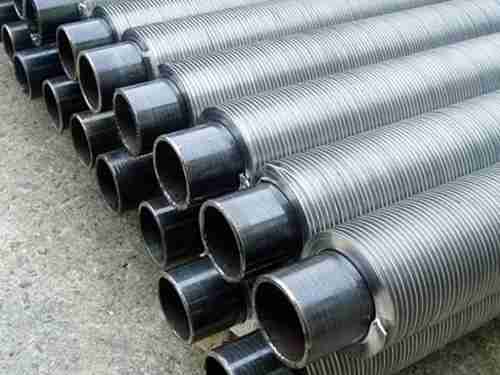The biggest advantage of p22 alloy steel pipe is that it can be recycled 100%, which is in line with the national strategy of environmental protection, energy saving and resource saving. The national policy encourages the expansion of the application field of high pressure alloy pipe.
Because of their different manufacturing processes, they are divided into hot-rolled (extruded) seamless steel pipes and cold-drawn (rolled) seamless steel pipes. Cold drawn (rolled) tubes are divided into two types: round tubes and special-shaped tubes.
a. Process flow overview
Hot rolling (extruded seamless steel pipe): round tube billet → heating → perforation → three-roller skew rolling, continuous rolling or extrusion → tube removal → sizing (or diameter reduction) → cooling → billet tube → straightening → water pressure Test (or flaw detection) → mark → storage.
Cold drawn (rolled) seamless steel pipe: round tube billet → heating → perforation → heading → annealing → pickling → oiling (copper plating) → multi-pass cold drawing (cold rolling) → billet → heat treatment → straightening → Hydraulic test (flaw detection)→marking→warehousing.
b. Seamless steel pipes are divided into the following varieties due to their different uses:
GB/T8162-1999 (seamless steel pipe for structure). Mainly used for general structure and mechanical structure. Its representative material (brand): carbon steel 20, 45 steel; alloy steel Q345, 20Cr, 40Cr, 20CrMo, 30-35CrMo, 42CrMo, etc.
GB/T8163-1999 (seamless steel pipe for conveying fluid). It is mainly used for conveying fluid pipelines in engineering and large-scale equipment. The representative material (grade) is 20, Q345, etc.
GB3087-1999 (seamless steel pipes for low and medium pressure boilers). Mainly used for pipelines for conveying low and medium pressure fluids in industrial boilers and domestic boilers. The representative material is 10, 20 steel.
GB5310-1995 (seamless steel pipes for high pressure boilers). It is mainly used for high temperature and high pressure transport fluid headers and pipes on boilers in power plants and nuclear power plants. The representative materials are 20G, 12Cr1MoVG, 15CrMoG, etc.
GB5312-1999 (carbon steel and carbon-manganese steel seamless steel pipes for ships). Mainly used for Class I and II pressure-resistant pipes for marine boilers and superheaters. The representative material is 360, 410, 460 steel grades, etc.
The sales of P22 alloy steel pipes are mainly used to transport high temperature and high pressure pipelines.
GB9948-1988 (seamless steel pipes for petroleum cracking). Mainly used in boilers, heat exchangers and their transmission fluid pipelines in petroleum smelters. Its representative materials are 20, 12CrMo, 1Cr5Mo, 1Cr19Ni11Nb, etc.
GB18248-2000 (Seamless steel pipes for gas cylinders). Mainly used to make various gas and hydraulic cylinders. Its representative materials are 37Mn, 34Mn2V, 35CrMo and so on.
GB/T17396-1998 (hot-rolled seamless steel pipes for hydraulic props). It is mainly used to make hydraulic supports, cylinders and columns in coal mines, as well as other hydraulic cylinders and columns. Its representative materials are 20, 45, 27SiMn, etc.
GB3093-1986 (high pressure seamless steel pipe for diesel engine). Mainly used for high pressure oil pipe of diesel engine injection system. The steel pipe is generally cold drawn pipe, and its representative material is 20A.
GB/T3639-1983 (cold drawn or cold rolled precision seamless steel pipe). It is mainly used for steel pipes for mechanical structures and carbon pressing equipment that require high dimensional accuracy and good surface finish. It represents material 20, 45 steel and so on.
GB/T3094-1986 (cold-drawn seamless steel pipe special-shaped steel pipe). It is mainly used to make various structural parts and parts, and its materials are high-quality carbon structural steel and low-alloy structural steel.
GB/T8713-1988 (Precision inner diameter seamless steel pipe for hydraulic and pneumatic cylinders). It is mainly used to make cold-drawn or cold-rolled seamless steel pipes with precise inner diameters for hydraulic and pneumatic cylinders. Its representative material is 20, 45 steel and so on.
GB13296-1991 (stainless steel seamless steel pipes for boilers and heat exchangers). Mainly used for boilers, superheaters, heat exchangers, condensers, catalytic tubes, etc. in chemical enterprises. High temperature, high pressure and corrosion resistant steel pipes. Its representative materials are 0Cr18Ni9, 1Cr18Ni9Ti, 0Cr18Ni12Mo2Ti and so on.
GB/T14975-2002 (Stainless Steel Seamless Steel Tube for Structural Use). Mainly used for general structure (hotel, restaurant decoration) and mechanical structure of chemical enterprises with resistance to atmosphere, acid corrosion and a certain strength of steel pipe. Its representative materials are 0-3Cr13, 0Cr18Ni9, 1Cr18Ni9Ti, 0Cr18Ni12Mo2Ti, etc.
GB/T14976-2002 (stainless steel seamless steel pipe for fluid transportation). Mainly used for pipelines conveying corrosive media. The representative materials are 0Cr13, 0Cr18Ni9, 1Cr18Ni9Ti, 0Cr17Ni12Mo2, 0Cr18Ni12Mo2Ti, etc.
YB/T5035-1993 (seamless steel pipe for automobile axle casing). It is mainly used to make high-quality carbon structural steel and alloy structural steel hot-rolled seamless steel pipes for automobile half-shaft casings and drive axle axle casings. Its representative materials are 45, 45Mn2, 40Cr, 20CrNi3A, etc.
API SPEC5CT-1999 (casing and tubing specification) is compiled and published by the American Petroleum Institute (American Petreleum Institute, referred to as "API") and is commonly used around the world. Among them: Casing: a pipe that extends into the well from the ground surface and is used as the lining of the well wall, and the pipes are connected by couplings. The main materials are J55, N80, P110 and other steel grades, as well as C90, T95 and other steel grades that are resistant to hydrogen sulfide corrosion. Its low steel grades (J55, N80) can be welded steel pipes. Oil pipe: a pipe inserted into the casing from the ground surface to the oil layer, and the pipes are connected by couplings or integrally. Its function is that the pumping unit transports the oil in the oil layer to the ground through the oil pipe. The main materials are J55, N80, P110, and C90, which is resistant to hydrogen sulfide corrosion, prepared and released by the American Petroleum Institute, and used all over the world.
Line pipe: It is to transport the oil, gas or water out of the ground to the oil and gas industry enterprises through the line pipe. Line pipes include seamless and welded pipes. The pipe ends include flat ends, threaded ends and socket ends; the connection methods are end welding, coupling connection, socket connection, etc. The main material of the tube is B, X42, X56, X65, X70 and other steel grades.
Welded steel pipe
The blanks used for welded steel pipes are steel sheets or strips, which are divided into furnace welded pipes, electric welded (resistance welded) pipes and automatic arc welded pipes due to their different welding processes. Due to the different welding forms, it is divided into two types: straight seam welded pipe and spiral welded pipe. because of the shape of the end and the tube). Mainly used for conveying general lower pressure fluids such as water, gas, air, oil and heating hot water or steam and other purpose pipes. It represents the material Q235A grade steel.
GB/T3092-1993 (galvanized welded steel pipe for low pressure fluid transportation). Mainly used for conveying general lower pressure fluids such as water, gas, air, oil and heating hot water or steam and other purpose pipes. Its representative material is: Q235A grade steel.
GB/T14291-1992 (Welded Steel Pipe for Mine Fluid Transport). It is mainly used for straight seam welded steel pipes for mine air pressure, drainage and shaft discharge gas. It represents the material Q235A, B grade steel.
GB/T14980-1994 (large diameter electric welded steel pipe for low pressure fluid transportation). Mainly used for conveying low pressure fluids such as water, sewage, gas, air, heating steam and other purposes. It represents the material Q235A grade steel.
GB/T12770-1991 (Stainless steel welded steel pipe for mechanical structure). Mainly used in machinery, automobiles, bicycles, furniture, hotel and restaurant decoration and other mechanical parts and structural parts. Its representative materials are 0Cr13, 1Cr17, 00Cr19Ni11, 1Cr18Ni9, 0Cr18Ni11Nb, etc.
GB/T12771-1991 (stainless steel welded steel pipe for fluid transportation). Mainly used for conveying low pressure corrosive medium. The representative materials are 0Cr13, 0Cr19Ni9, 00Cr19Ni11, 00Cr17, 0Cr18Ni11Nb, 0017Cr17Ni14Mo2, etc.

 Español
Español English
English











